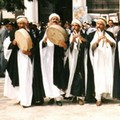Human Rights Watch (HRW) released its 2024 annual report, painting a concerning picture of alleged continued restrictions on freedom of expression and association in Morocco. The report cites the imprisonment of high-profile journalists, activists, and protest leaders, allegedly as «retaliation for their criticism of the ruling monarchy».
The report highlights lawyer Mohamed Ziane's case, sentenced to three years on 11 charges, six of which HRW contends «blatantly violated his right to free speech».
HRW also reports that journalists Omar Radi, Slimane Raissouni, and Taoufik Bouachrine remain imprisoned after what it deemed to be «flawed court proceedings» on various charges, including some related to sexual assault and harassment. HRW claims «multiple underhanded tactics» used against them and others «to crush dissent and dissenters».
Journalists and social media activists
Saïd Boukioud's five-year sentence under Article 267 for Facebook criticism of the Royal decision to normalize ties with Israel in 2020 further underscores the climate of suppression, the NGO further claims.
HRW alleges a record of documenting «dozens of journalists and social media activists» convicted on charges of libel, publishing «false news», insulting officials, and undermining state security or the monarchy.
The report criticizes the alleged ongoing harassment and bureaucratic hurdles faced by the Moroccan Association for Human Rights (AMDH), that would be, according to HRW, hindering their ability to operate freely.
In Western Sahara, HRW expresses concern for the 19 local men imprisoned after allegedly «unfair trials» in 2013 and 2017 for the killing of 11 members of the security forces.
As for the Rif region, HRW refers to the imprisonment of 40 «Hirak» movement demonstrators, with some facing decades-long sentences.
HRW also criticized what it called Morocco's lack of a «credible independent investigation compensation to survivors and families of victims of a June 24, 2022, incident in which Moroccan and Spanish border police used excessive force in response to an attempt by 1,300 to 2,000 men—most from Sudan, South Sudan, and Chad—to scale the chain-link fences around the Spanish enclave of Melilla».





 chargement...
chargement...













